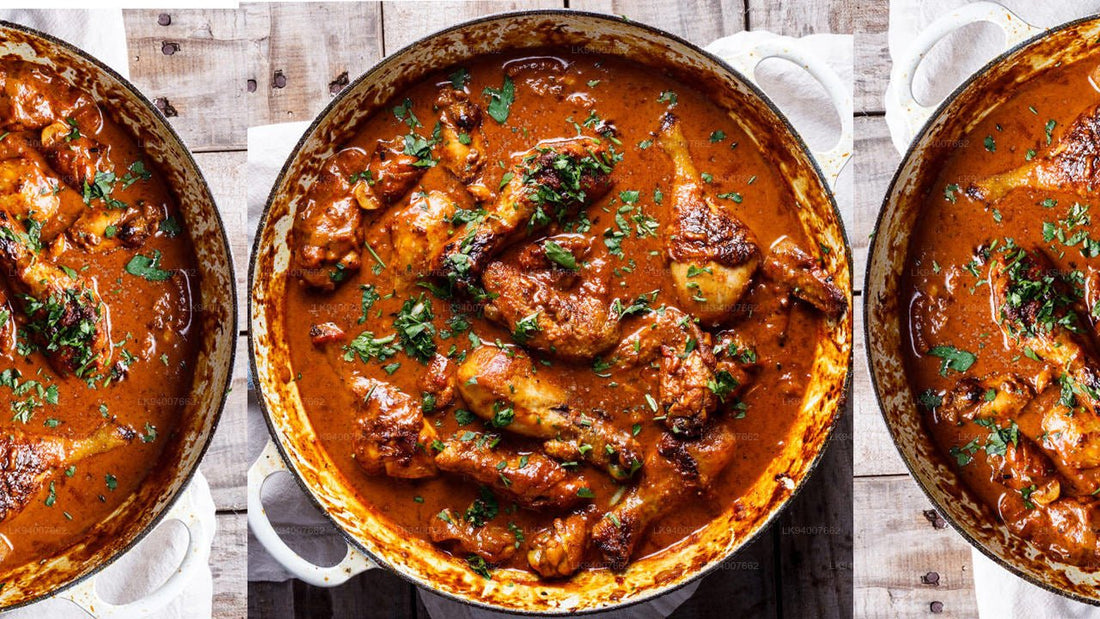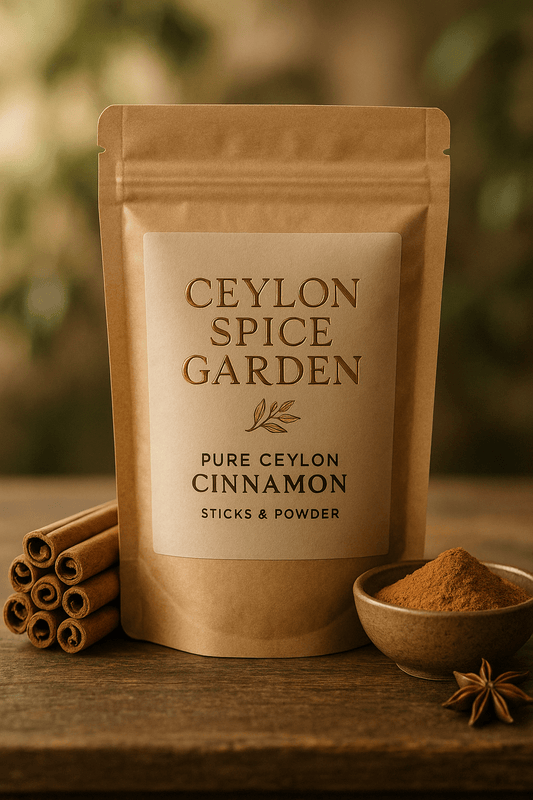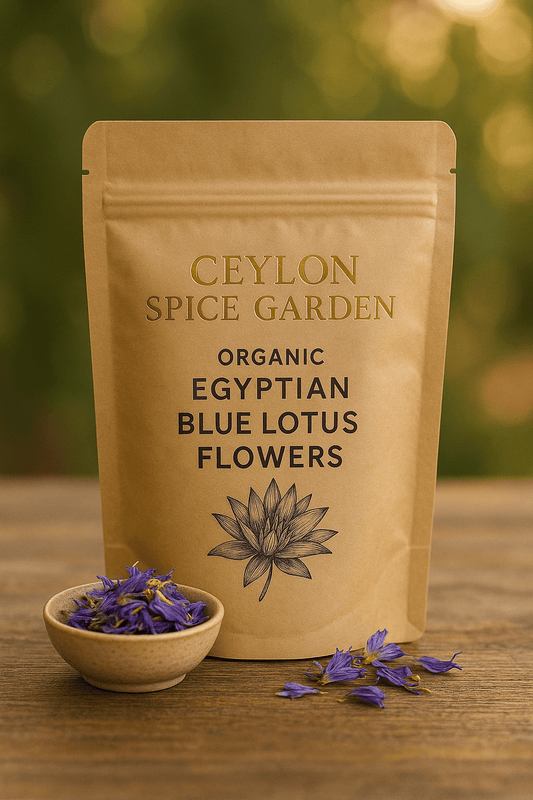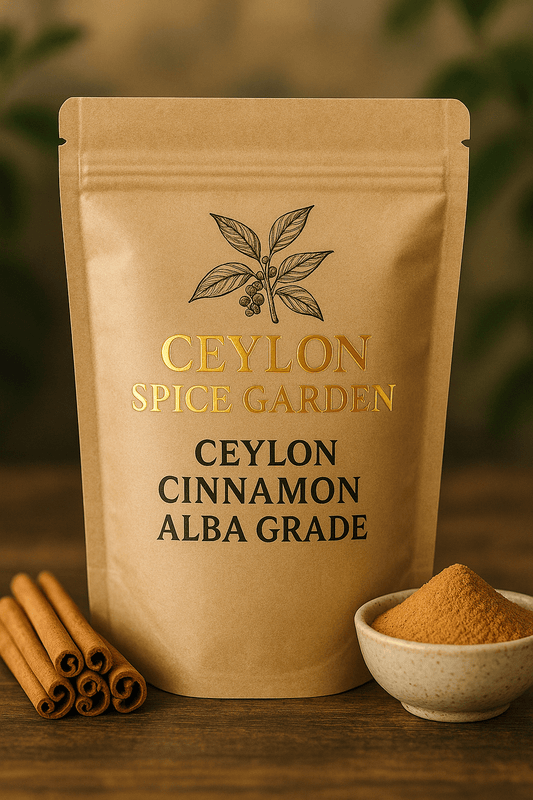
Sri Lankan Chicken Curry Recipe with Ceylon Spices | Ceylon Spice Garden
Authentic Sri Lankan Chicken Curry Recipe with Ceylon Spices: A Traditional Culinary Journey
Table of Contents
Introduction to Sri Lankan Chicken Curry
Sri Lankan chicken curry, known locally as "Kukul Mas Curry," represents the heart of Ceylon cuisine. This beloved dish combines tender chicken pieces with a complex blend of aromatic spices, creating a symphony of flavors that has been passed down through generations. Unlike Indian or Thai curries, Sri Lankan chicken curry features a unique spice profile that emphasizes the use of freshly roasted and ground Ceylon spices, coconut milk, and distinctive curry leaves.
The magic of authentic Sri Lankan chicken curry lies in its careful balance of heat, sweetness, and aromatic complexity. Each family in Sri Lanka has their own variation, but the foundation remains consistent: high-quality Ceylon spices from trusted sources like Ceylon Spice Garden, fresh ingredients, and time-honored cooking techniques.
Understanding Ceylon Spices
Ceylon spices are renowned worldwide for their superior quality, intense aroma, and exceptional flavor profiles. The unique terroir of Sri Lanka, with its tropical climate and rich soil, produces spices that are distinctly different from those grown elsewhere. When preparing authentic Sri Lankan chicken curry, the quality of your spices directly impacts the final result.
Key Ceylon Spices for Chicken Curry
- Ceylon Cinnamon: Sweeter and more delicate than cassia, with subtle citrus notes
- Ceylon Black Pepper: More pungent and complex than regular pepper
- Ceylon Cardamom: Intensely aromatic with cooling properties
- Ceylon Cloves: Stronger and more aromatic than imported varieties
- Ceylon Curry Leaves: Fresh leaves provide authentic flavor impossible to replicate
For the most authentic taste, sourcing genuine Ceylon spices is crucial. Ceylon Spice Garden offers premium-quality spices directly from Sri Lankan spice gardens, ensuring your curry achieves that authentic flavor profile that makes Sri Lankan cuisine so distinctive.
Essential Ingredients
For the Spice Blend:
- 2 tablespoons Ceylon coriander seeds
- 1 tablespoon Ceylon cumin seeds
- 1 teaspoon Ceylon fennel seeds
- 6-8 Ceylon black peppercorns
- 4-5 Ceylon cloves
- 3-4 Ceylon cardamom pods
- 1 inch Ceylon cinnamon stick
- 1 teaspoon Ceylon fenugreek seeds
For the Curry:
- 1.5 kg chicken, cut into pieces
- 2 medium onions, sliced
- 4 cloves garlic, minced
- 1 inch ginger, grated
- 2 stalks lemongrass, bruised
- 15-20 fresh curry leaves
- 3 green chilies, slit
- 2 tablespoons Ceylon chili powder
- 1 tablespoon Ceylon turmeric powder
- 400ml coconut milk
- 2 tablespoons coconut oil
- 1 tablespoon tamarind paste
- Salt to taste
- 1 cup water
Step-by-Step Preparation
Preparing the Spice Blend
- Heat a dry pan over medium heat. Add coriander seeds, cumin seeds, and fennel seeds. Roast for 2-3 minutes until fragrant, stirring constantly to prevent burning.
- Add peppercorns, cloves, cardamom pods, cinnamon stick, and fenugreek seeds. Continue roasting for another minute until all spices are aromatic.
- Transfer the roasted spices to a plate and let them cool completely. This cooling process is essential for achieving the perfect grind.
- Using a spice grinder or mortar and pestle, grind the cooled spices into a fine powder. The freshly ground spice blend will be incredibly aromatic – this is the foundation of your curry's flavor.
Marinating the Chicken
- In a large bowl, combine chicken pieces with half of the ground spice blend, chili powder, turmeric powder, and salt.
- Mix thoroughly, ensuring each piece is well-coated with the spice mixture.
- Cover and refrigerate for at least 30 minutes, or preferably 2-3 hours for deeper flavor penetration.
Traditional Cooking Techniques
The Cooking Process
- Tempering the Spices: Heat coconut oil in a heavy-bottomed pot over medium heat. Add curry leaves, allowing them to splutter for a few seconds to release their essential oils.
- Building the Base: Add sliced onions and sauté until golden brown. This caramelization adds sweetness and depth to the curry.
- Creating the Flavor Foundation: Add minced garlic, grated ginger, lemongrass, and green chilies. Sauté for 2-3 minutes until fragrant.
- Incorporating the Chicken: Add the marinated chicken pieces and increase heat to medium-high. Sear the chicken for 5-7 minutes, stirring occasionally to ensure even browning.
- Developing the Curry: Add the remaining ground spice blend and stir well. Cook for 2-3 minutes to toast the spices and deepen their flavor.
- Adding Liquids: Pour in the coconut milk and water. Add tamarind paste and stir to combine. Bring to a gentle boil.
- Simmering to Perfection: Reduce heat to low, cover partially, and simmer for 30-40 minutes until the chicken is tender and the curry has thickened to your desired consistency.
- Final Adjustments: Taste and adjust seasoning. Add more salt, tamarind for tanginess, or coconut milk for richness as needed.
Serving Suggestions
Sri Lankan chicken curry is traditionally served as part of a larger meal spread. Here are authentic accompaniments that complement the rich flavors:
- Rice Options: Fragrant basmati rice, traditional red rice, or coconut rice (kiribath)
- Bread Alternatives: Fresh roti, pol roti (coconut flatbread), or string hoppers
- Side Dishes: Papadum, coconut sambol, seeni sambol (caramelized onion relish)
- Vegetable Accompaniments: Gotukola salad, tempered green beans, or eggplant moju
- Cooling Elements: Fresh cucumber slices, raita, or wood apple chutney
Nutritional Benefits
Sri Lankan chicken curry isn't just delicious – it's also packed with nutritional benefits, thanks to the powerful properties of Ceylon spices and fresh ingredients.
| Component | Health Benefits |
|---|---|
| Ceylon Cinnamon | Regulates blood sugar, anti-inflammatory properties, rich in antioxidants |
| Turmeric | Powerful anti-inflammatory, supports immune system, aids digestion |
| Black Pepper | Enhances nutrient absorption, supports digestive health, antioxidant properties |
| Curry Leaves | Rich in vitamins A, B, C, and E, supports heart health, aids in weight management |
| Coconut Milk | Provides healthy fats, supports immune function, promotes satiety |
| Ginger & Garlic | Boost immunity, anti-inflammatory, support cardiovascular health |
Regional Variations
While this recipe represents the classic Colombo-style chicken curry, Sri Lanka's diverse regions each have their unique interpretations:
Regional Curry Styles
- Jaffna Style: Uses more dried red chilies and includes drumstick (murunga) for added flavor
- Kandy Style: Features a thicker gravy with roasted rice powder for body
- Southern Style: Incorporates goraka (garcinia cambogia) for sourness instead of tamarind
- Eastern Style: Often includes potatoes and uses less coconut milk for a drier curry
Storage and Reheating Tips
One of the beautiful aspects of Sri Lankan chicken curry is that it tastes even better the next day as the flavors continue to develop.
Storage Guidelines:
- Refrigerator: Store in an airtight container for up to 4 days
- Freezer: Can be frozen for up to 3 months in freezer-safe containers
- Portioning: Freeze in individual portions for convenient meals
Reheating Instructions:
- Stovetop: Gently reheat over medium-low heat, adding a splash of water or coconut milk if needed
- Microwave: Heat in 30-second intervals, stirring between each interval
- From Frozen: Thaw overnight in the refrigerator before reheating
Frequently Asked Questions
Ready to Create Your Own Sri Lankan Culinary Masterpiece?
Experience the authentic taste of Sri Lanka with premium Ceylon spices from Ceylon Spice Garden. Our hand-selected, freshly ground spices will transform your cooking and bring the true flavors of Ceylon to your kitchen. Visit our collection today and discover why Ceylon spices are treasured by chefs worldwide!











